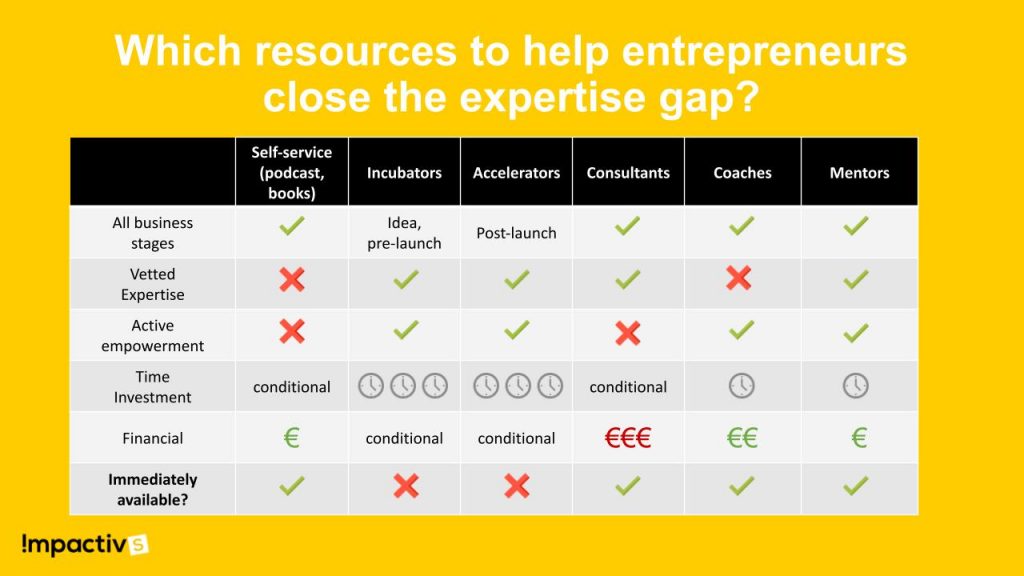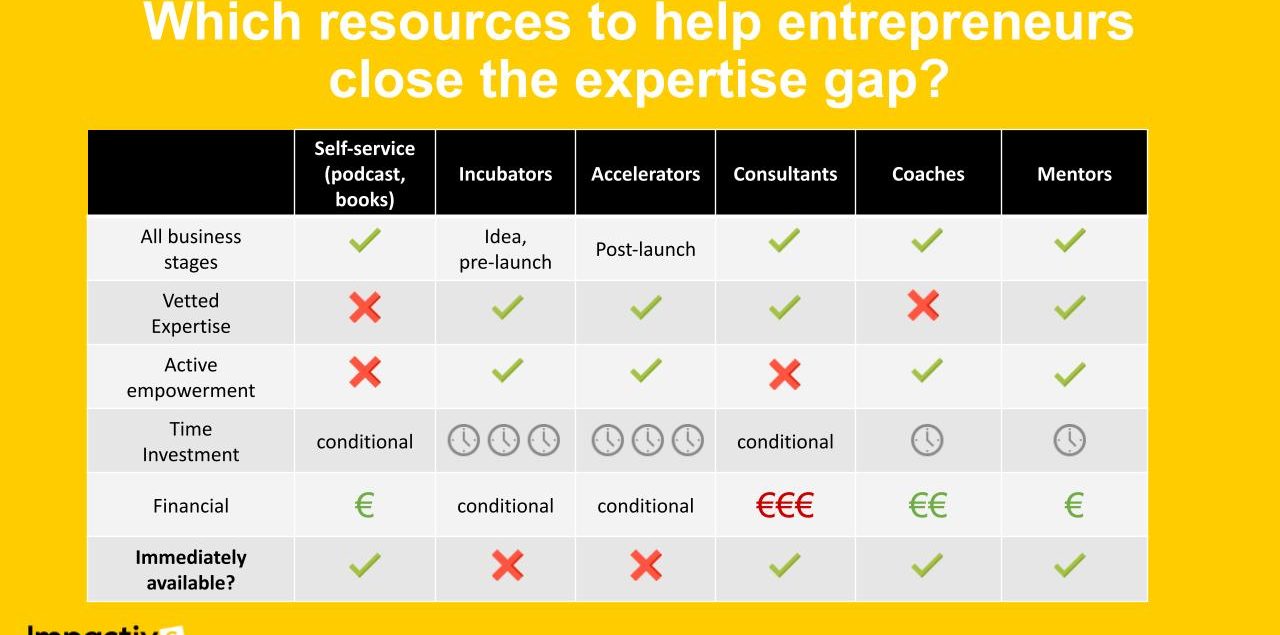Incubators, Accelerators, Mentors, Coaches… What you need on your impact entrepreneur journey and when
In 2018, around 3.3 million jobs were generated from 2.5 million new enterprises in the EU according to Eurostat. Entrepreneurship is a long and hard, albeit very fulfilling journey. It’s full of ups and downs, challenges and celebrations, and most importantly – countless moments when you ask yourself what the heck you should do next.
Impact Entrepreneurs Need a Support System
If you look at an average entrepreneur’s journey to success, it can be broken down into 6 steps: idea, concept, commit, validate, scale, and establish. At each step of the way, there are challenges that are exceptionally difficult to navigate, especially if you have no previous knowledge or experience.

source: startupcommons.org
Entrepreneurship blogs and self-help books are great, but even they aren’t always enough to hold your hand or help you get over the obstacles you might face when the going gets tough!
Incubators, Accelerators, Mentors, Coaches, and more
As ideal as it would be to seek help from friends and family, more often than not, their knowledge and expertise might not be what you need or they simply might not have the time. This can be a real struggle because it means that oftentimes entrepreneurs believe they must travel the road alone. But do they really?
Some of the greatest business books often suggest forming a mastermind group. So that you’re surrounded by like-minded people that can help, support, and motivate you through the tough times. When choosing your support network, having a vision that’s aligned with your support system is crucial in order to make the full impact you can.
But that’s not the only option either. Some of the greatest business minds have credited their success to mentors and coaches. Nowadays, there are even more resources available. Along with coaches and mentors, incubators and accelerators can offer entrepreneurs a significant advantage through the support, guidance, and capital they can provide.
Incubators
Incubators are here to help you reach milestones in your business. They guide and assist fledgling businesses and help them reach their full potential. Popular incubators include Seedcamp, Seedrocket, Founder Institute, Ace Incubator, and more. In the impact ecosystem, Impact Hub proposes various of them, and many countries have their own set of actors.
Incubators offer new and young (not your personal age, but business age) entrepreneurs an environment of growth. Incubators are a wonderful fit when you’re still fleshing out your idea and creating your concept. In fact, one of the primary goals of an incubator is to help you create an MVP (minimum viable product).
However, not everyone may want to participate in an incubator. Incubators require a large time commitment, and unfortunately, that is often something entrepreneurs are short on. This requirement is then amplified by the fact that incubator programs start at specific times in the year and run over a long period of time (average is 1-2 years).
Incubators typically require your efforts to be full-time (or very consequent) and to adhere to a specific schedule. While many decide to become a business owner due to their love for independence, this won’t be fully possible while being part of an incubator as you are expected to answer your mentor adhere a schedule.
Accelerators
Since the failure rate for new businesses is fairly high within the first years, a lot of entrepreneurs’ biggest fear is that they’ll turn into one of those statistics. Accelerators, which are often confused with incubators, help reduce the likelihood of that happening. Accelerators offer similar benefits to incubators, including programs to support the growth of you and your business.
Many may have heard of popular accelerator programs like Y Combinator, Techstars, 500 Startups, AngelPad, and more. Some accelerator programs are specifically geared and designed towards social entrepreneurs desiring to make a positive social and environmental impact. These accelerator programs include SoPact and Rally. Also here, each country has its own actors and programs worth a dive.
As the name suggests, accelerator programs are designed to help speed up the growth of business ideas with proven models. They are usually post-revenue. Accelerator programs are often very intense, timed, and offer greater opportunities for funding. Typically, accelerators will help you find investors who will in return ask for a stake in the company. Accelerators are crucial for those entrepreneurs who need funding, and who have proven that their business idea is profitable, as well as fulfills a need in the marketplace.
Essentially, this is the next step after the incubator. When your business has an MVP, structure, and organized plan of action. Once you’ve committed to your idea and concept, it’s time to look for an accelerator program to join. While the process can be tedious and stringent, it’s well worth it.
No matter how helpful accelerator programs can be, there are some drawbacks to consider. They typically require a strong commitment. Programs can be specialized yet you might also have to learn or deliver on topics that may not be relevant to your particular case or that you have already done in the past. Accelerators are usually rolled out by cohorts hence with a specific start date which might be at timings that aren’t ideal for you or your team.
Consultants
Many people get confused between consulting, coaching, and mentoring. Honestly, it’s hard to blame them! They all do very similar things. Consultants get paid to help an individual or organization with a given problem (or process). They typically have specialized knowledge and experience in a specific area. This allows them to take a look at your business and find ways to optimize and perfect its inner workings. This could be supply chain, manufacturing processes, customer experience, etc.
Consultants are available on an ad hoc basis and will use their experience to be more efficient and productive, so in the end, your business runs smoother.
Even though it may seem like a no-brainer to hire a consultant, it can come at a cost that not every entrepreneur can afford. Especially at the beginning of your entrepreneurial journey, budgets can be tight and it can be difficult to find extra resources to spend on anything outside of the operational costs. Most likely you’re familiar with cost-benefit analysis, and this situation is no exception – weigh the pros and cons in order to make the right decision for you and your business.
Coaches
Unlike a consultant or a mentor, a coach doesn’t find or suggest solutions to your problems. Coaches are there to help you with your mindset, as well as help YOU find the solution to your challenges.
The primary difference between working with a mentor and a coach is whether or not self-reflection is involved. Working with a coach typically involves regularly scheduled conversations. During these conversations, you will be prompted to find solutions to your own challenges using what you have at your disposal.
Coaches are there to help you find the answer, not provide the answer to you. They are focused on self-development and empowering you to be the solution to your problems. Some of the most successful founders and CEOs had their own coaches, including Jeff Bezos (Amazon), Larry Page (Google), and Steve Jobs (Apple).
Mentors
A mentor is someone who has successfully done what you’re looking to do. Mentors are a great resource to bounce ideas off of, get advice from, and gain valuable feedback on a variety of things.
Depending on the mentor, they may be able to connect you with their own network, or at least point you in the right direction. Mentors offer a lot of advantages, but they are typically best used when you’ve committed to your idea, and you’re ready to get going. That’s because you want to find a mentor that is doing/has done similar things to what you’re trying to accomplish.
Should you decide to seek out a mentor, it’s important to realize that it’s a symbiotic relationship. Since mentors are successful, they’re also busy. This means they don’t want their time being wasted by someone who either won’t take their advice or isn’t fully committed.
When agreeing to be mentored, know that you’re agreeing to be fully present when engaging with them. That you’re also agreeing to take into account whatever advice they give you and not simply ignore it. Most importantly, you’re agreeing to try your absolute best to make this business a success and learn from the experience.
Mentors are typically an expert in one particular area (finance, marketing, sales, etc.) and typically won’t be able to help you with all aspects of your business. Chances are throughout your journey, as challenges pop up, you will benefit from having mentors in different areas. It may prove to be helpful to have a marketing mentor, a scaling mentor, a sales mentor, etc.
Even more important though is to find the right mentor at the right time. Challenges are made much easier when you have the right mentor there holding your hand and holding you accountable at that exact time.
The good news is a lot of seasoned entrepreneurs and executives are willing to help younger founders, especially if they can support new ventures on their mission to make a positive social and environmental impact.
You are not Alone
Many people have a dream of starting their own business and a vision of making a positive impact. But it can be quite discouraging when you have to do it on your own. Thankfully, you don’t have to, and you shouldn’t do it all on your own!
Having a team of people to support you, your dream, and your vision is an integral part of your success as an entrepreneur. Looking for external support to close the expertise gap will also be an essential driver of growth. So, which support to look for? Truth is that it depends on your context, needs, and resources. Here is a comparative table to help you identify which resource might be the best fit for you.

At Impactivs, we understand the hardship and difficulties of starting and running a business for good. Which is precisely what led us to bring together resources to empower impact entrepreneurs. Impactivs connects entrepreneurs with mentors, industry experts, and tools to give them an immediate boost on their journey to success, and to help make a difference in the world.
If you are looking to make a greater social and environmental impact by starting a business, join our mailing list to stay in the know, and be ready to take your venture to the next level!

